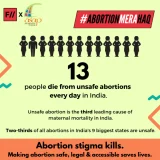Should we be proud or ashamed when Vietnam has one of the highest abortion rates in the world?- By Youth champion Le Hoang Minh Son
 Should we be proud or ashamed when Vietnam has one of the highest abortion rates in the world?
Should we be proud or ashamed when Vietnam has one of the highest abortion rates in the world?
On the Internet, it’s very easy to search “abortion in Vietnam” and get the result: “Vietnam has one of the highest abortion rates in the world”, “the highest abortion rate in Southeast Asia”, “top 5 countries have the highest abortion rate”…
But when the health managers and policy maker’s look at such articles on mass media, which contain these titles, they are concerned– how can we reduce the rate of abortion or remove this from mass media. Thus, what they have actually done is draft a law, which bans abortion from the 2nd trimester.
So, should we be proud or ashamed?
5 reasons why we should be proud:
- Many women have been saved every day because of access to safe abortion services.
- The complication related to abortion is very low (0,17% 1)
- Reduced maternal mortality ratio to 3/4th between 1990 and 2015 (reach the MDGs) 2
- Accurate statistical indicators of abortions and related issues to solve the unintended pregnancies among women and young girls by promoting safe sex and contraceptive use.
- Promote and support abortion rights – women’s rights as human rights (abortion in Vietnam is legal according to Population Ordinary in 1989).
5 reasons why we should be ashamed:
- Unwanted pregnancy is still common
- Parents and adults feel shy when talking about sexuality, reproductive health and related issues with their children
- Teachers ignore and skip the Sexuality Education session at schools
- Unmet need for Contraceptive Methods and difficulty in access.
- Abortion myths and stigma are exist and perpetuated every day in the community
In conclusion, abortion restrictions would only make abortions unsafe and endanger women’s health. Evidence shows that where abortion is permitted on broad legal grounds, it is generally safe, and where it is highly restricted, it is typically unsafe 3
Vietnam health manager and policy makers should be proud and continue promotion of safe abortion!!
References-
1 – Reporting on the implementation of national objectives for gender equality in 2014
2 – Reported by United National in Vietnam
3 – The World Health Report 2008 – primary health care now more than ever, WHO, 2008






